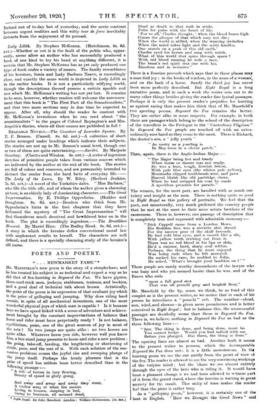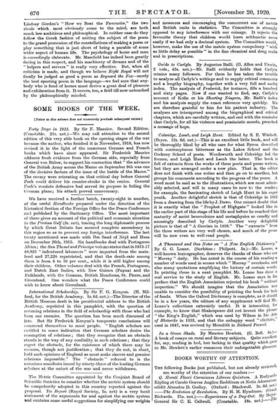POETS AND POETRY.
. . NEWMARKET FAME."
MIL MASEFIELD'S new poem is the story of a steeplechase, and he has treated his subject in as technical and expert a way as he did that of fox-hunting in Reraard the Fox. We have gipsies, three-card-trick men, jockeys, stablemen, trainers, and bookies, and a good deal of technical talk about horses. Artistically, the point of the poem is its expression of that exultant joy which is the prize of galloping and jumping. Why does riding hard remain, in spite of all mechanical inventions, one of the most wonderful physical joys of which man is capable ? Is it because here we have speed linked with a sense of adventure and achieve. ment brought by the constant improvisations of balance that horse and rider must have perpetually ready? Is not balance, equilibrium, poise, one of the great sources of joy in most of the arts ? No two jumps are quite alike ; no two horses are fit.iite alike. Whatever horse you ride, however well you know him, a fair-sized jump presents to horse and rider a new problem : the going, take-off, landing, the lengthening or shortening of stride, pace, and the rest of it. With each solution of the sue- emir° problems comes the joyful rise and sweeping plunge of the jump itself. Perhaps the heady pleasure that is the Prize of speed has seldom been better described than in the following paeesge " A tide of horses in fury flowing. Beauty of speed in glory going.
And away and away and away they went, visib.e song of what lite meant. laving in houses, sleeping in bed, _ /doing to business, all seemed deed, • 144 Rorsa. By John Masefield. Loncleu: William Heinemann. Its. set]
Dead as death to that rush in strife, Pulse for pulse with the heart of life. `For to all,' Charles thought, 'when the blood heats high Comes the glimpse of that which may not die; When the world is stilled, when the wanting dwindles When the mind takes light and the spirit kindles, One stands on a peak of this old earth.'
Charles eyed his horses and sang with mirth.
What of this world that spins through space ? With red blood rooming he rode a race, The beast's red spirit was one with his. Emulous and in ecstasies."
There is a Russian proverb which says that in three places may a man find joy : in the books of wisdom, in the arms of a woman; and on the back of a horse. Surely the third joy has never been more perfectly described. But Right Royal is a long narrative poem, and in such a work the writer sets out to do many other things besides giving the reader fine lyrical passages. Perhaps it is only the present reader's prejudice for hunting as against racing that makes him think that of Mr. Masefield's two sporting poems, Reynarcl the Fox remains the better. They are rather alike in some respects. For example, in both there are passages which belong to the school of the description of the travellers in the Prologue to the "Canterbury Pilgrims." In Reynard the Fox people are touched off with an extra- ordinarily sure hand as they come to the meet. There is Richard, the doctor's son, a '' jolly youth "
"As merry as a yearling is
In !daytime in a clover patch."
Then, again, there is the Anglo-Indian Major .—
"The Major being hot and heady When horse or dinner was not ready. Ho was II lean, tough, liverish fellow, With pale blue eyes (the whites pale yellow), Moustache clipped toothbrush-wise, end jaws Shaved bluish like old partridge claws. When he had stripped his coat lie made A sneckleas presence for parade."
The women, for the most part, are handled with as much cer- tainty and insight as the men. There is nothing quite so good in Right Royal as this gallery of portraits. We feel that the poet, not unnaturally, very much preferred the country people that he met at the meet to their more astute brothers of the racecourse. There is, however, one passage of description that is completely true and expressed with admirable economy :—
"Dick Cappell name from a London Mews,
His fleshless face was a stretcht skin sheath
For the narrow pear of the skull beneath.
He had cold blue oyes, and a mouth like a slit,
With yellow teeth sticking out from it.
There was no red blood in his lips or skin, He'd a sinister, hard, sharp soul within.
Perhaps, the thing that he most enjoyed Was being rude when he felt annoyed. He sucked his cane, he nodded to John, He asked, 'What's brought your lambkin on ?' "
These people are surely worthy descendants of the lawyer who was busy and who yet seemed busier than he was, and of the Reeve who rode
"upon a full good stot That was all pornela grey and heighte Soot."
Mr. Maseficld by the by, must, we think, be as fond of this couplet as is the present writer, as we notice that in each of his poems he introduces a " poniele " cob. The weather—cloud, sun, wind, and shower—is given more prominence and is better conceived in Right Royal ; but to balance this, the unsuccessful passages are decidedly worse than those in Repuzni the Fox. Them is, we believe, nothing in Reynard the Fox as had as the three following lines :— " SHE. The thing is done, and being done, must be. You cannot hedge. Would you had talked with ins Before you plunged. But there, the thing is done."
The opening lines are almost as bad. Another fault it seems to the present writer to possess, which the incomparable
Reynard the For does not : it is a little monotonous. In ths hunting poem we see the run partly from the point of view of the fox. The reader is allowed to see the very convincing workings of the vulpine mind ; but the 'chase we sec almost entirely through the eyes of the hero Who is riding it. It would have been a pleasant change it we had been allowed to witness part of it from the grand stand, where the heroine is waiting in great anxiety for tilt: result. This unity of tone makes the reader fee! that the piece is rather long.
As a "galloping poem," however, it is certa;rdy one of the best in English. "How we Brought the Good News" and Lindsay Gordon's "How we Beat the Favourite," the two rivals which most -obviously come to the mind, are both much leas ambitious and philosophical. In neither case do they follow the Greek fashion of uniting the subject of the poem to the grand procession of the constellations of making a poem or play something that is just short of being a parable of some wider aspect of human life. The psychology of horse and man is exceedingly elaborate. Mr. Masefield has indeed been greatly daring in this respect, and his machinery of dreams and of the "helpers and servers" is really very effective. But, when all criticism is made, and though we believe Right Royal will not finally be judged as good a poem as Reynard the Fox—surely the best sporting poem in the language—we feel sure that any- body who is fond of horses must derive a great deal of pleasure and exhilaration from it. It covers, too, a field till now untouched by the philosophically minded.



































 Previous page
Previous page